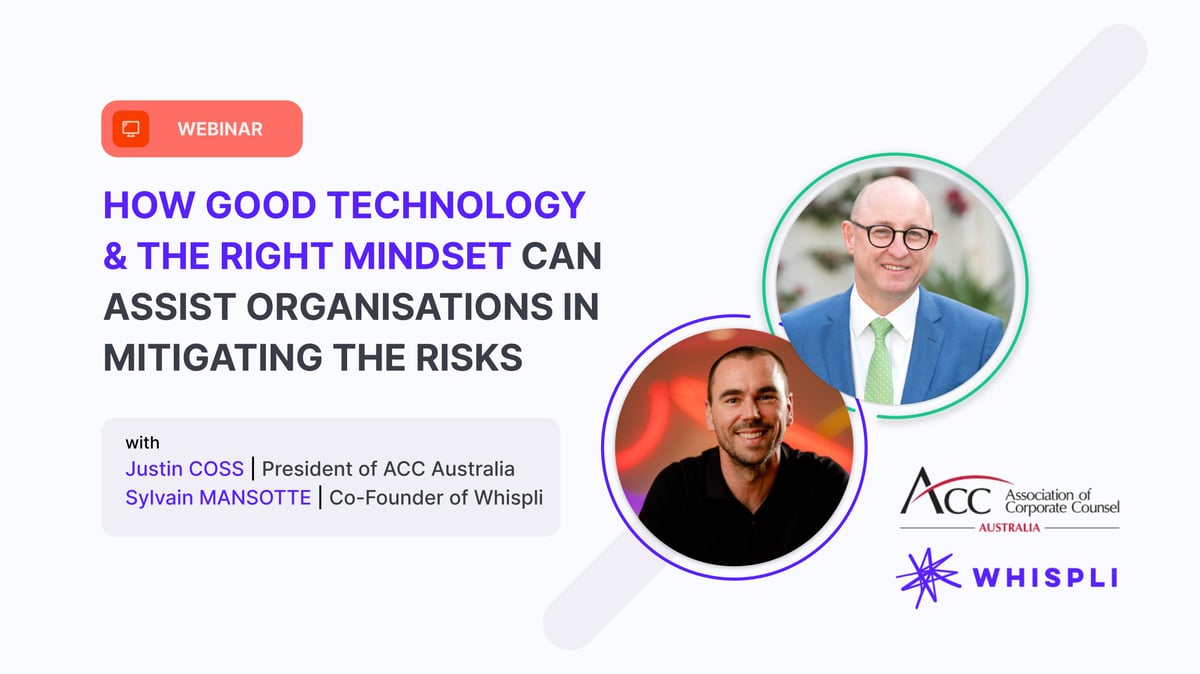How good technology and the right mindset can assist organizations in mitigating the risks

SPEAKERS
EXECUTIVE SUMMARY
Sylvain was the whistleblower on a $20m+ fraud before turning investigator for that very same Organization. This experience prompted him to start Whispli, the industry leader in whistleblowing platforms for ethical and security-conscious Organizations. Since then, Whispli has helped hundreds of companies of all sizes (including the ACCC, Westpac and Qantas) implement their Whistleblowing Program. Here are some key takeaways from their discussion:
Barriers to blow the whistle
As a Whistleblower himself, Sylvain experienced roadblocks when he had to blow the whistle at the time:
- Scarcity of means for reporting: only a hotline was available, but his accent could have identified him;
- Confusing reporting channels;
- Not wanting to go to an external party to report.
The main reasons that Sylvain identified for a person choosing not to blow the whistle when faced with wrongdoing were the feelings of fear and shame. For most people, these feelings prevent them from reporting: the fear of consequences (losing their job for example) and the shame of being wrong.
How to overcome fear & shame
- You have to take the fear and the shame away by providing people with a way to feel comfortable when they speak up. This means ensuring their anonymity and putting the employees and the Organization on the same step level.
- Removing the label of “Whistleblower” and start talking about Trusted Conversation by going at the root of the concept of Whistleblowing. In Sylvain’s words,
“Whistleblowing is one type of conversation
on the spectrum of what we call
Trusted Conversations.
Benefits of Whistleblowing for Organizations
We often think of Whistleblowing in terms of Compliance, regarding fraud or corruption. But we often forget that if we broaden the spectrum of these trusted conversations, benefits can appear for the Organization and its employees:
- The more you address the employees' concerns, the more you increase their satisfaction and at the same time increase retention and productivity.
- Employees that feel comfortable in their work environment will be less likely to give the company a bad reputation or leave out of exhaustion
Building trust in the reporting channels you have available makes reporting easier and will increase the early detection of risks.
Good technology and a good mindset must go hand in hand
In the experience of the speakers, the success of a whistleblowing program can vary. Justin Coss explains:
“I’ve implemented three whistleblowing programs [...].
If I extrapolate the success I’ve had with these whistleblowing programs, there is a direct correlation between management’s mindset,
their openness, their willingness to embrace change and
their willingness to actually have people come forward and
the success of the Whistleblowing platform.
Organizations need to set the tone at the top: the more open the management is and the more they communicate about the whistleblowing program, the more successful it will be. Leading by example, giving consistent feedback to reports, and setting up a clear framework for employees is key.
How Whispli technology can guarantee a successful Whistleblowing program
- Automate your triage and investigations - make sure your reports are allocated to the right people in your Organization based on the topic of the matter raised:
- avoid mass petty complaints with an automatic triage of reports to the right team/case manager
- Identify more risks - Whispli clients receive 3 to 10 times more reports than they did before because moving to newer technologies enables more conversations. But in this case, more conversations means saving time:
- Risks are picked up early
- Employees are happier, which increases their productivity
- By building trust and showing empathy, employees feel valued and recognized
- Anonymity is guaranteed:
- Contact details are never asked when setting up an account;
- Each report has an anonymous pseudonym and avatar. Even if the informant chooses to reveal its identity at a later point of the investigation, the next time they make a report a new avatar and pseudonym will be generated to guarantee their anonymity on this new matter;
- The Organization or Whispli can not trace the device the informant is using to speak up;
- All metadata from files are removed.
Listen to the Webinar to learn more about:
✅ Sylvain’s unique story and experience as a whistleblower
✅ What makes a successful whistleblowing program
✅ New ideas/thoughts on how to increase visibility on matters related to misconduct
✅ How to encourage your employees to speak up
✅ Issues to consider in adapting your whistleblowing program to the new normal






